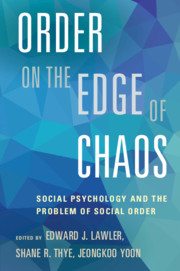Book contents
- Frontmatter
- Contents
- List of Contributors
- Preface
- 1 Social Psychology of Social Order: An Introduction
- 2 The Evolutionary Biology and Sociology of Social Order
- 3 Social Rationality and Weak Solidarity: A Coevolutionary Approach to Social Order
- 4 An Integrative Theory of Action: The Model of Frame Selection
- 5 The Center Cannot Hold: Networks, Echo Chambers, and Polarization
- 6 Social Exchange and Social Order: An Affect Theory Approach
- 7 Institutions, Trust, and Social Order
- 8 Identity Verifi cation and the Social Order
- 9 Identities, Roles, and Social Institutions: An Affect Control Account of Social Order
- 10 The Gender Frame and Social Order
- 11 Status, Power, and Social Order
- 12 Interaction Order: The Making of Social Facts
- 13 The Arts of Together: Social Coordination as Dyadic Achievement
- 14 Dignity as Moral Motivation: The Problem of Social Order Writ Small
- 15 The Legitimacy of Groups and the Mobilization of Resources
- Commentary: Contrasts and Complementarities
- Index
- References
12 - Interaction Order: The Making of Social Facts
Published online by Cambridge University Press: 05 December 2015
- Frontmatter
- Contents
- List of Contributors
- Preface
- 1 Social Psychology of Social Order: An Introduction
- 2 The Evolutionary Biology and Sociology of Social Order
- 3 Social Rationality and Weak Solidarity: A Coevolutionary Approach to Social Order
- 4 An Integrative Theory of Action: The Model of Frame Selection
- 5 The Center Cannot Hold: Networks, Echo Chambers, and Polarization
- 6 Social Exchange and Social Order: An Affect Theory Approach
- 7 Institutions, Trust, and Social Order
- 8 Identity Verifi cation and the Social Order
- 9 Identities, Roles, and Social Institutions: An Affect Control Account of Social Order
- 10 The Gender Frame and Social Order
- 11 Status, Power, and Social Order
- 12 Interaction Order: The Making of Social Facts
- 13 The Arts of Together: Social Coordination as Dyadic Achievement
- 14 Dignity as Moral Motivation: The Problem of Social Order Writ Small
- 15 The Legitimacy of Groups and the Mobilization of Resources
- Commentary: Contrasts and Complementarities
- Index
- References
Summary
Abstract
The worry that a loss of tradition will lead to chaos in modernity has been a preoccupation since the 1800s. In 1893 Durkheim championed the idea that new forms of social practice were developing in modernity that could produce coherence, morality and solidarity in the absence of tradition. The Interaction Order approach developed by Garfinkel, Goffman and Sacks develops Durkheim's idea, treating social facts – like self, identity and social objects – as made through cooperative social actions that do not depend on tradition. The cooperation and reciprocity required for social fact making replace tradition as the foundation of social coherence in modernity. The result is a post individualist post utilitarian approach that challenges conventional assumptions about the coherence of modern life. The work of these three scholars taken together comprises a comprehensive contemporary approach that completes the challenge to individualism (naturalism) and utilitarianism launched by Durkheim, changes epistemological (how we know) and ontological (how things exist) questions and exposes worries about chaos in modernity as artifacts of the individualist approach.
INTRODUCTION
The contemporary Interaction Order approach, initiated by Garfinkel, Goffman, and Sacks, is an important advance in social theory that breaks down barriers to discovery through detailed observation of “social facts.” It takes up Durkheim's proposal to replace individual centered approaches with a focus on the making of social facts. In doing so it overcomes epistemological limitations of individualist and naturalist approaches and reveals a strong cooperative and moral center to modern social life. Those hypothetical individuals, pictured as rational and utilitarian from birth, that populate other theories, are replaced by social selves that need to cooperate in interaction with others to create and sustain self, reason, sense, and value. The result is an innovative approach that locates coherence in the order properties of social practices in modern social contexts. The idea that chaos results when traditions and beliefs erode is replaced by studies of the coherence and stability created by mutual cooperation in situated interaction.
The discovery that interaction orders have performative criteria that are constitutive of the existence of social facts establishes that cooperative actions that meet these criteria can create social things.
- Type
- Chapter
- Information
- Order on the Edge of ChaosSocial Psychology and the Problem of Social Order, pp. 227 - 247Publisher: Cambridge University PressPrint publication year: 2015
References
- 2
- Cited by

